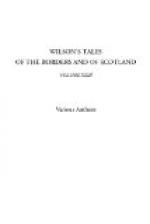Oh, woman! ye wadna be angry if ye kenned what an
awfu’ thing it is to see a thousan’ een
below ye, and aboon ye, and round about ye, a’
staring upon ye like condemning judges, an’
looking into your very soul—ye hae nae idea
o’ it, mother; I tell ye, ye hae nae idea o’t,
or ye wadna be angry. The very pulpit floor gaed
down wi’ me, the kirk wa’s gaed round about,
and I thought the very crown o’ my head wad
pitch on the top o’ the precentor. The
very een o’ the multitude soomed round me like
fishes!—an’ oh, woman! are ye dumb?
will ye torment me mair? can ye no speak, mother?”
But he spoke to one who never spoke again. Her
reason departed, and her speech failed, but grief
remained. She had lived upon one hope, and that
hope was destroyed. Her round ruddy cheeks and
portly form wasted away, and within a few weeks the
neighbours, who performed the last office of humanity,
declared that a thinner corpse was never wrapt in
a winding sheet than Mrs. Jeffrey. Time soothed,
but did not heal the sorrows, the shame, and the disappointment
of the son. He sank into a village teacher, and
often, in the midst of his little school, he would
quote his first, his only text—imagine the
children to be his congregation—attempt
to proceed—gaze wildly round for a moment,
and sit down and weep. Through these aberrations
his school dwindled into nothingness, and poverty
increased his delirium. Once, in the midst of
the remaining few, he gave forth the fatal text.
“My brethren!” he exclaimed, and smiting
his hand upon his forehead, cried, “Speak, mother!—speak
now!” and fell with his face upon the floor.
The children rushed screaming from the school, and
when the villagers entered, the troubled spirit had
fled for ever.
THE LAWYER’S TALES.
THE STORY OF MYSIE CRAIG.
In detailing the curious circumstances of the following
story, I am again only reporting a real law case to
be found in the Court of Session Records, the turning-point
of which was as invisible to the judges as to the
parties themselves—that is, until the end
came; a circumstance again which made the case a kind
of developed romance. But as an end implies a
beginning, and the one is certainly as necessary as
the other, we request you to accompany us—taking
care of your feet—up the narrow spiral
staircase of a tenement called Corbet’s Land,
in the same old town where so many wonderful things
in the complicated drama—or dream, if you
are a Marphurius—of human life have occurred.
Up which spiral stair having got by the help of our
hands, almost as indispensable as that of the feet,
we find ourselves in a little human dovecot of two
small rooms, occupied by two persons not unlike, in
many respects, two doves—Widow Craig and
her daughter, called May, euphuized by the Scotch
into Mysie. The chief respects in which they might
be likened, without much stress, to the harmless creatures
we have mentioned, were their love for each other,




